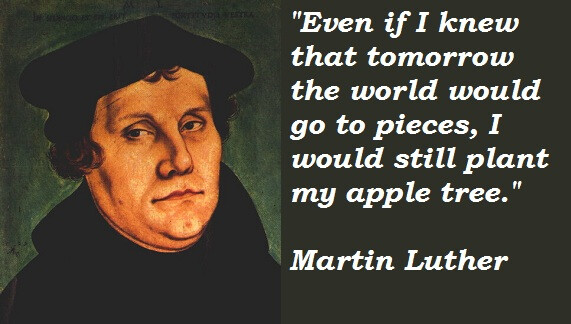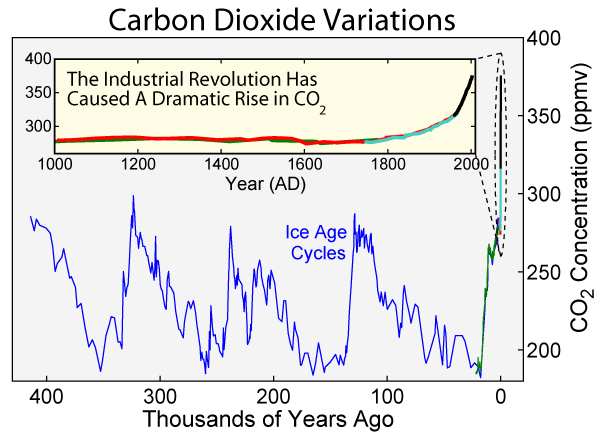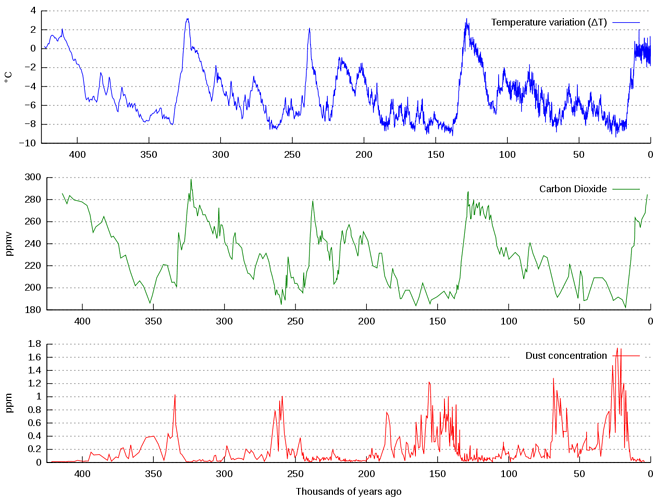Dr. Katharine Hayhoe was recently interviewed about climate change, and as usual, gives a lot of excellent insights about our social interactions around this. My apologies if this was already linked in another thread somewhere - but if so, I couldn’t find it. It would bear repeated attention in any case.
Thanks for sharing – I think her distinction between “denialist” and “dismissive” is helpful. I can see why calling someone a denier can make for a charged interaction and shut off conversation before it starts, while “dismissive” seems more like a description of an action or outlook that can be changed.
I can also see her point about how psychologically we can only take so much fear – while I do try to take climate change seriously, I also see the appeal of burying one’s head in the sand, at times anyway.
I wonder if this program in which a reporter takes along a climate change denier to investigate the evidence. About ten minutes in they stop to talk to Dr. Katherine Hayhoe. I wonder if this program could help denialists to change their opinion.
Thanks for that link - that was a nicely done video. I plan to share that.
Katherine Hayhoe was just on the Fareed Zakaria GPS show on CNN talking about the weather Texas is experiencing. She suggested calling it “global weirding” instead of “global warming” in order not to confuse people when unusually cold weather occurs. She also described the cold temperatures they’re having in Texas as being like what happens when one "leaves the freezer door open.
She has a PBS show and youtube channel about it:
As I grew up in the Texas Tech area, and she teaches there, she is one of my heroes!
Thanks for this. I wonder if anyone has a good discussion of the Ancient Near East cultural context and meaning of Genesis 8: 20-22
20 Then Noah built an altar to the Lord and, taking some of all the clean animals and clean birds, he sacrificed burnt offerings on it. 21 The Lord smelled the pleasing aroma and said in his heart: “Never again will I curse the ground because of humans, even though[a] every inclination of the human heart is evil from childhood. And never again will I destroy all living creatures, as I have done.
22 “As long as the earth endures,
seedtime and harvest,
cold and heat,
summer and winter,
day and night
will never cease.”
We had a discussion in our church last week --one remarked, “we can really mess stuff up still, and have to be careful; we just don’t want to make any one cause an idol.”
The wording of this covenant seems so vague that I thought a cultural clarification may help limit its inappropriate application. I don’t think it applies to global warming–winter and summer mean temperature ranges occur–that happens in deserts, and we know already that the Sahara and the Petrified Forest, for example, were once much wetter. Those were likely not from man made changes, though the Sahara appears to be expanding, and current temperatures are rapidly rising, from man’s unintentional effects. In fact, the global poor, who live in the warmest regions, stand to lose the most.
I can jive with the elder–any cause, as both Lewis and Chesterton have observed, becomes a tyrant if not modulated with God’s perspective, and especially if not approached in a kind, listening manner.
Thanks.
PS I passed this on to someone to review–I still need to watch some of the linked videos and read it better.
Meet Katharine Hayhoe, Christian Climate Scientist - Article - BioLogos
And if anybody needed any more scriptural evidence of the truth of that thought - just direct them right back to the verses you already quoted. What if the response to these assurances were: “I see that God promises seedtime and harvest! So why all the work to plant, water, and cultivate? I think I’ll just take it easy then because I see that harvest time is guaranteed by the promise of God!” That man will experience a ‘harvest time’ to be sure! He will reap what he has sewn.
Most people have no problem seeing that. Just because seasons will continue does not at all guarantee just what kind of seasons those will be for us. And it is anything but a guarantee that we can’t screw things up and make them worse for ourselves and our children.
Do you think that there is sensationalism and fear-mongering in the way climate change is reported and discussed. The recent fires in Austalia and the current ones in Canada probably do more harm than all the vehicles in the world put together. And we have no idea, really, how much difference our distance from the sun actually makes.to mean temperatures. There are so many factors involved. will turning off 1 light bulb (or TV) for 5 hours make that much difference?
The earth has shown itself to be more than capable of redressing imbalances in air pressure and temperature without resorting to the extreme of an ice age. I am not saying that we ignore these things but…
Perhaps there is some hyperbolae involved? (maybe we think it is necessary to get some sort of response?)
Richard
You raise good points here. And these are needed discussions.
In an age where the only things getting much public attention tend to be sensational and dramatized, how would you get an urgently important message out to the public? You could refuse to join in the din of shouting and let your warnings get lost in obscure technical journals or back pages of newspapers.
Or should you join in all the “shouting” and sensationalizing in order for your message to be heard too? The answer to that is not obvious to me. It is obvious, though, that one very effective way to drown out all hope of easy access to real truth is for everybody and their uncle to have highly-platformed voices about everything they feel strongly about. When we as a society reward such attention-greed with our clicks, advertising dollars, and votes - it does seem that good information (our closest approach to any real confidence) is the first casualty of that populist frenzy.
It has always been said that if there were a global catastrophe that could be predicted we should not advertise it for fear of a global panic that cannot be stopped. Occupying the populous with futility might be an answer to that but there is some responsibility to the truth, isn’t there?
My wife has just pointed out an Internet announcement that 2 large asteroids are going to pass by the Earth, one even closer than the moon. What are we supposed to do with this sensational information? (Daily Mirror)
Freedom of the press would appear to be a two-edged sword.
Richard
Interesting to consider. After reading and looking at the comments, my “gestalt” take is that God promises the cycles of life with continue, and in a way is an affirmation that we are to not look to doomsday and end of earth type prophesies but rather to continue our commanded task of being God’s representative on earth as bearer of his image, and subject to his authority.
Some may still twist that to serve their selfish desires, to subdue the earth, but I read it as to be stewards and assist in God’s creation. Also, it seems to have implications that rapture theology may not be what some seem to think it is, but that gets a little further afield.

Indeed!
Maybe one of the things we’ll learn to acclimate ourselves too is just a higher ambient threshold of noise in our information world. In some ways we’ve already acclimated to a whole lot. We’ve become jaded enough (many anyway) about corporate commercialism that marketers have to work harder and harder to compete for attentions. We are quick to be bored … maybe not quite as quick to doubt as we should be. But we’ve all become (or maybe will become?) much more acclimated to not letting every digital billboard or blog suddenly divert our attention to its commands.
We’re in the middle of one.
First, we should verify it. Got any evidence of it?
There are sensationalists, as with any issue in society. However, this doesn’t cast doubt on whether CO2 is a greenhouse gas that traps heat in our atmosphere.
We know the levels of CO2 in our atmosphere over the last 500,000 years or so. It has always fluctuated between 175 and 300 parts per million (ppm).
We are currently over 400 ppm which is a 30-40% increase. Fires have always occurred in nature, but that has never driven CO2 to levels we are seeing now. Obviously, something is different. That difference is the fact we are burning fossil fuels.
Also, temperature has also fluctuated with CO2, mostly due to the difference in CO2 solubility in cold vs. warm water.
So we already know that temperature fluctuates, and the main culprit is thought to be the Milankovitch cycles which involve changes in the Earth’s orbit, tilt, and other factors. This is why the ice ages and interglacial periods are somewhat clock like. So we already have a strong understanding of what causes natural changes in temperature.
What we are seeing now is an increase in a gas that traps heat in an atmosphere. Basic physics tells us that this will increase global temperatures because that is what greenhouse gases do. This was understood clear back in the 1800’s. The first rough calculations estimated in the late 1800’s suggested a 2C increase in global temps for each doubling in CO2.
I like your diagram–thank you!
I forgot who posted this earlier.
xkcd: Earth Temperature Timeline
So why, after over 200 years have we not found a way to siphon it off or “clean it?”
We appear to be past prevention. I guess cure is the next step.
Basically it is the futile gesture principle that is being employed. At least if you are doing something you can alleviate the blame onto someone else.
A few years ago there were reports of holes in the Ozone layer that were preventing the reflection of heat back down to earth… the reverse of the Greenhouse gas syndrome.
But, of course the two problems do not intersect?
Richard
There is some truth in that … but also a fair bit of danger too, when denialists try to find some refuge in that attitude to defend their unwillingness to engage. “Oh well - we’re past the point of changing it anyway …”
A more realistic (and probably less horrible for our planet’s future inhabitants - our children) would be to think of it this way: Nothing is ever so bad that we can’t keep making it worse. It’s a continuum, the end of which you will never reach - even when you think you’re in hell already.
Continuum:
… paradise, really great, good, okay, acceptable, not good - but we can live with it, this hurts, this really hurts!, just plain bad, really bad, - okay we mistakenly thought the last one was bad!, maybe most of us will survive, some of us might survive, the unlucky ones will survive, hell, - okay we thought the last one was hell … you get the picture.
We have almost certainly made the climate future a whole lot more bleak for most of the world’s population (mostly those who are the poorest and least responsible for it all). And we can keep persisting in denialism to see how much farther down that scale we can make things for our grandkids.
Granted - it’s not just climate that makes life hell for so many. Our collective addiction to warfare and turning entire populations into refugees is also one of the larger elephants among the herd in the room.
And while that all sounds bleak, the hope then is this: we can - as you say - not just look for curatives and solutions, as well as keeping on trying to cut back on things that make it all worse; but we are also relieved of the need to think that any one solution has to be some magic pill that jumps us all the way back up to “paradise”. Nothing can do that - short of God’s redemption and new creation itself. But meanwhile we can at least make decisions that help aim in that direction since our children might actually appreciate and benefit from those efforts. And if being good or loving others isn’t enough of a reason for some of the religious among us to care about creation, then there’s always the biblical mandate that … it’s our assigned task.
We have discovered ways, but it is expensive, requires lots of resources, and expensive.
From my understanding, the hole in the ozone layer was letting in ionizing radiation in the form of UV rays which posed a risk of increased cancer rates and other issues related to increases in ionizing radiation.
It is worth noting that the chemicals responsible for putting a hole in the ozone were banned worldwide and the hole has begun to heal.
Most definitely!

